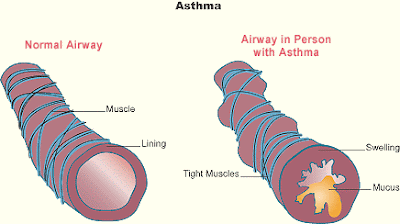Immune System Disorders and It’s ConsequencesImmune System | Biotechnology
In this post we are going to discuss about the various disorders or dysfunctions of the
Immune System and their impact on our life. This is a follow up post after
Functions of Immune system.
So far we have discussed Immune System Basic Concepts, Innate Immunity, Cells of Immune System, AdaptiveImmune System, Organs of Immune System and Functions of Immune system.
Consider all previous (Mentioned above) lessons
including this one as an overview of what I am going to explain in my upcoming
lessons. If you have not gone through previous lessons then this is the right
time to build your basics on these topics and get required information which is
actually essential for every student and help you to follow my explanations in
next posts.
Since I am always suggesting learning with patience
and step by step learning is the best way to get the correct and useful
information.
Now let’s begin with the topic,
Improper
functioning of the Immune System can lead to the over activity or abnormal low activity of our immune response.
In Immune studies, the immune response to an antigen
works as a “two edged sword”. It
either protects or harms the host.
The Disorders
of Immune System can be categorized under the following type:
·
Allergy or Asthma
·
Graft rejection and Graft versus
host disease
·
Autoimmune disease
·
Immunodeficiency
·
Allergy
or Asthma :
In simple words, Allergy is a process which triggers an allergic reaction.
When immune system goes the wrong way, the allergic
reaction is produced by normal human body processes.
It can be like on touching a house pet or reaction to plant pollens.
Asthma
is the severe symptom of immune over
reaction or an allergy.
Asthma
is a chronic disease of lungs, due to
inflammation in the airway which results in reversible
airway obstruction.
Symptoms
of Asthma are:
Ø Wheezing
Ø Tightness and heaviness in chest
Ø Breathlessness
·
Graft
rejection and Graft versus host disease :
Skin
and organ transplants from one person to the other are known
as grafts.
These grafts are rejected
by the host body in most of the cases due to dysfunctioning
of the immune system. They are also known as tissue rejection.
To minimize graft rejection, drugs are used to suppress the immune system of host, which makes
the host more prone to various kinds of
infection.
Graft
versus host disease (GVHD) occurs when host cells are
recognized as foreign by the donor cells and start attacking them.
Symptoms
can be mild, severe or fatal also.
Graft versus host disease is of two types:
Ø Acute GVHD
Ø Chronic GVHD
i.
Acute GVHD :
It comprises of the following feature:
a.
Cause
severe acute morbidity (weight loss, lack of activity) leading to death.
b.
Tissue necrosis in the target organs.
c.
Th1 cytokines are produced.
d.
Immune
deficiency is there.
e.
Anti host cytotoxic T lymphocytes
(CTL)
are reactive.
ii.
Chronic GVHD :
The important characteristic points are:
a.
More
survival rate with chronic morbidity.
b.
Occurrence
of fibrosis and inflammatory changes.
c.
Production
of Th2 cytokines.
d. Auto
antibodies
are produced
e. There is no anti host cytotoxic T lymphocytes reactivity.
·
Autoimmune
Disease :
The function of immune system is to recognize and
reject foreign body.
Due to improper
functioning of immune system, the body
itself starts getting damaged by its own immune system.
This process is known as Auto immune disease.
i.
Symptoms
:
The symptoms vary according to the person’s immune system and the disease caused.
They include:
Ø Anxiety or depression
Ø Blood sugar change
Ø Digestive problems
Ø Fatigue and dizziness
Ø High body temperature
Ø Extreme sensitivity to cold in
hands and feet
ii.
Common Autoimmune diseases
:
They are:
Ø Hashimoto’s thyroiditis
Ø Rheumatoid arthritis
Ø Type I diabetes
Ø Lupus erythematosus
Ø Crohn’s disease
Ø Grave’s disease
iii.
Factors associated with Auto immune
disease :
Among various reasons
responsible for having autoimmune disease, some factors are also kept in mind, which are related for happening of
autoimmune disease.
They are:
Ø Environmental
Factors
Ø Hormonal
Influence
Ø Genetic
Physiology
·
Immunodeficiency
:
Sometimes, immune system has its own problems within
itself, which are called disorders.
Immunodeficiency
is a disease which is caused when immune
system is less active than its normal working phenomenon.
It can be caused
as a result of genetic diseases or by a
viral infection, such as AIDS (Acquired
Immunodeficiency Syndrome) which is caused by retrovirus HIV (Human Immunodeficiency Virus).
i.
Types of Immunodeficiency
:
They are
categorized under following three
heads:
Ø Primary Immunodeficiency
Ø Severe Combined Immunodeficiency
(SCIDS)
Ø Secondary Immunodeficiency
Ø Primary Immunodeficiency
:
It is genetic based
and involves lack of B cell
or T cell activity.
During B cell
defect, there is a lack of Antibodies
(Ab).
In T cell
disorder, either thymus is missing or
working abnormally.
Ø Severe Combined Immunodeficiency
(SCIDS) :
In SCIDS,
both parts of the lymphocyte system are
missing or not working properly.
There is no
adaptive immune response.
Ø Secondary Immunodeficiency
:
This type of immunodeficiency is acquired i.e. caused due to damage after birth.
The reasons might be viral infection, drugs or radiations.
ii.
Symptoms
:
The common symptoms
associated with immunodeficiency are:
Ø Pneumonia, sinus and chronic cough
Ø Cough up blood
Ø Difficulty in breathing
Ø Diarrhea
Ø Enlarged spleen
Here, we have discussed all the key points related
to ImmuneSystem Disorders or Immune System Dysfunctions.
In further coming discussions, we will pick and discuss
each topic extensively.
Till then, keep learning and clearing your concepts
and enjoy.
There is lot more to share, Keep in
touch and stay happy.
Happy BioTechnology Learning!!!




